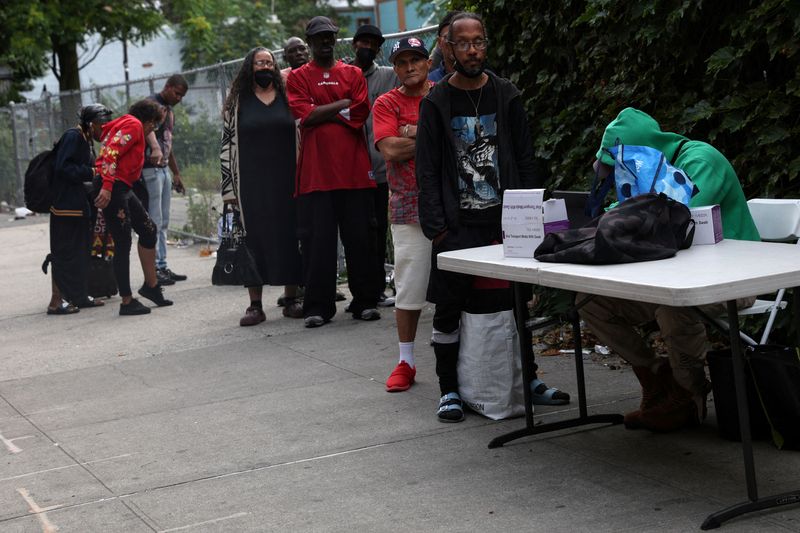Highly mutated COVID variant found in new countries but pandemic in ‘a different phase’
2023.08.24 15:29

© Reuters. FILE PHOTO: People wait in line to take a COVID-19 oral swab test on a sidewalk in the Harlem neighborhood of New York City, U.S., June 20, 2023. REUTERS/Shannon Stapleton/File Photo
By Jennifer Rigby and Julie Steenhuysen
LONDON/CHICAGO (Reuters) – A highly mutated COVID variant called BA.2.86 has now been detected in Switzerland and South Africa in addition to Israel, Denmark, the U.S. and the U.K., according to a leading World Health Organization official.
The Omicron offshoot carries more than 35 mutations in key portions of the virus compared with XBB.1.5, the dominant variant through most of 2023 – a number roughly on par with the Omicron variant that caused record infections compared to its predecessor.
It was first spotted in Denmark on July 24 after the virus infecting a patient at risk of becoming severely ill was sequenced. It has since been detected in other symptomatic patients, in routine airport screening, and in wastewater samples in a handful of countries.
A dozen scientists around the world said while it was important to monitor BA.2.86, it was unlikely to cause a devastating wave of severe disease and death given immune defenses built up worldwide from vaccination and prior infection.
“It’s still low numbers,” Maria Van Kerkhove, COVID-19 technical lead at the WHO, said in her first interview regarding BA.2.86.
That the known cases are not linked suggests it is already circulating more widely, particularly given reduced surveillance worldwide, she said.
Scientists are testing how well updated COVID-19 vaccines will work against BA.2.86. Kerkhove noted that vaccines have been better at preventing severe illness and death than re-infection.
“We are in a very different phase (of the pandemic) than if this popped up in the first year,” said Marion Koopmans, a Dutch virologist who advises the WHO.
Dr. Nirav Shah, principal deputy director of the U.S. Centers for Disease Control and Prevention, said the agency and others spotted the new variant last week, held meetings with scientists throughout the weekend, and issued a risk assessment on Wednesday. There have been nine such cases detected as of Aug. 23 and the variant was also found in wastewater in Switzerland.
It appears that current tests and medications remain effective against BA.2.86, although the variant may be more capable of causing infection in vaccinated people and those who have had COVID previously, the assessment said. There is no evidence yet that it is causing more severe illness.
Still, the potential risk must be taken seriously, experts said, and surveillance must continue, if not at levels undertaken at the pandemic’s peak.
“Governments cannot drop the ball,” Van Kerkhove said, adding that the coronavirus continues to circulate, evolve, infect and kill people.
TESTING DOWN 90%
Another COVID subvariant called EG.5 already has some people on high alert in the U.S.
Pharmacy chains CVS, Walgreens and Rite Aid (NYSE:) told Reuters on-site molecular tests and sales of at-home tests increased in recent weeks.
How much surveillance is needed to track the virus remains an open question, health experts said, and the countries that have detected the new variant all have strong genomic sequencing capacity. As of December 2022, 84% of countries could sequence Sars-CoV-2 in-country, according to WHO figures.
But data submitted to the international database, GISAID, has fallen dramatically. In the first week of Omicron, more than 200,000 coronavirus sequences were submitted. Last week, it was around 20,000.
“When we do sequencing now, it’s like (finding) a needle in a haystack,” said Tyra Grove Krause, a Danish epidemiologist at the Statens Serum Insitut which identified three BA.2.86 cases.
The WHO said COVID testing has declined by 90% worldwide from the peak. Testing has also plummeted in the U.S., and sequencing is down by around 90%, said Dr. Ashish Jha, who served as White House COVID-19 Response Coordinator until June 2023.
Data from hospital admissions, emergency room visits, deaths, wastewater sampling and sequencing, including at airports, has helped fill in the global picture, he said.
Jha and others, including the European public health agency and COVAX, the global program for getting vaccines to the world’s poorest, said COVID surveillance and defenses could be reactivated in the event of a major infection wave.
“It would take resources; it would take will; it would take people deciding this is important to do,” Jha said. “But … we’ve largely figured out how.”








